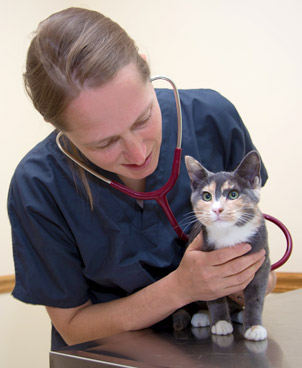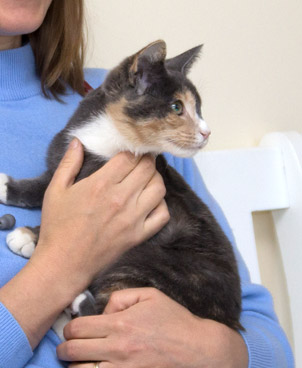Pet Wellness Services
Wellness Examinations • Vaccinations • Puppy & Kitten Care • Vaccination Policy • Flea and Tick Prevention • Heartworm Care • Senior Care
Wellness Examinations
At Fieldstone Animal Hospital, we believe that prevention contributes to your pet's long-term health and minimizes the lifetime cost of care. We strongly recommend routine wellness exams, vaccinations, regular lab work, deworming and fecal checks, medications to prevent fleas and ticks to help keep your pet in optimum health.
Wellness examinations are the same for your pet as the yearly physical you receive from your doctor. It is a chance for us to assess your pet's overall health, discuss any changes we see, and educate and update you on advancements in veterinary care. It is also an opportunity for you to discuss any of your concerns. Please take a look at the services we offer to learn why we believe they are important to the care and well-being of your pet. Then give us a call to set up an appointment today!
 Your pet's wellness examination includes our commitment to:
Your pet's wellness examination includes our commitment to:
- Examine your pet's teeth, throat, and oral cavity
- Check your pet's vision and eye health
- Examine the ears for infection, ear mites, allergic reactions, and other related health issues
- Examine the respiratory system
- Assess your pet's heart and evaluate cardiac function
- Test your pet's reflexes
- Palpate lymph nodes and abdomen
- Inspect the skin
- Palpate joints and muscles for arthritis and other orthopedic conditions
- Evaluate the function of internal organs and other systems
- Assess changes in body weight, appetite, urination, and bowel habits
- Inquire about your pet's activity level
- Palpate the skin for unusual growth developments
- Monitor your pet's blood count
- Utilize laboratory testing to detect early signs of Lyme or heartworm disease
- Assess general or specific changes in your pet's health since the last wellness visit
- Discuss preventive techniques with you
- Examine fecal samples for signs of parasitic infestation
- Evaluate your pet for repetitive licking or biting in one area
- Assess your pet's hair/fur and check for matting
- Demonstrate (to you) how to administer at-home medication
- Engage you in conversation and answer your questions and concerns
Annual baseline testing of your pet’s blood and urine can identify the presence of underlying diseases and helps create a baseline should your pet become ill between regular examinations.
Deworming and Fecal Check: Dangerous parasites are always present in the environment. If brought into your home, these parasites can be passed from your pet to you and your family. Regular fecal checks and deworming are the best way to prevent parasitic disease and the transmission of intestinal parasites. It also prevents the shedding of parasite eggs, which can contaminate lawns (or any other place a pet defecates).
Regular Blood Work: A complete physical includes parasite screening, blood tests, and a heartworm test. Not only can a blood chemistry panel and complete blood count (CBC) identify the presence of underlying disease processes, but these tests help create a baseline should your pet become ill. Additionally, blood work is necessary if a dental cleaning, removal of a skin mass, or any other procedure that requires anesthesia, is recommended.
At home, watch for subtle changes in your pet's bodyweight, appetite, water intake, urination and bowel habits, as well as general attitude and activity level. These changes may be signs of medical problems. Lumps and bumps under the skin can be serious. Ear infections, abscessed teeth, and gum disease are common, painful conditions that may not become obvious until seriously advanced. A comprehensive physical exam is the tool to evaluate your dog's, cat's or other pet's health status and to help you make informed decisions about the care of your special companion.
Vaccinations
Due to the many innovations in veterinary medicine, your pet can be protected against most major infectious diseases. Today, many immunizations and preventative treatments are available that did not exist a decade ago. Up-to-date vaccinations play a large part in keeping your pet healthy and free from disease.
Our Vaccination Policy
For the health and safety of our patients, clients, and staff, we strongly recommend that all core vaccinations be up-to-date. If you choose not to vaccinate your pet according to our recommended schedule, we may require serum blood titers to determine if your pet has adequate protection against certain diseases as a result of previous vaccines. In certain situations, you may be asked to sign a waiver stating that you understand the potential consequences if your pet bites or scratches someone and we have no proof that he or she has received a proper immunization against rabies.
Most of our patients are exceptionally sweet animals that would not show aggression under normal circumstances, but animals that are fearful or in pain can behave in unexpected ways. We have a responsibility to protect everyone at our facility and appreciate your understanding. Exceptions to this policy will be made if your veterinarian feels that a vaccine is not in the best interest of your pet’s health.
Core Vaccines for Dogs & Cats
Core vaccines for dogs include canine distemper, canine adenovirus (hepatitis), canine parvovirus, and canine parainfluenza. Combined in one injection, the vaccine is called DAPP. Rabies vaccine is required for all dogs by the state of New Hampshire.
Core vaccines for cats include panleukopenia virus (also known as feline distemper), feline calicivirus, and rhinotracheitis (also known as herpes virus). The vaccines are combined in one injection called FVRCP. Rabies vaccine is required for all cats by the state of New Hampshire.
Non-Core Vaccines for Dogs
Non-core vaccines for dogs include Bordetella, Leptospirosis, Lyme disease, and Canine Influenza vaccines.
Bordetella is a bacteria commonly associated with respiratory infections in dogs. It is one of the more common bacterial causes of canine infectious tracheobronchitis—also known as kennel cough. Bordetella is highly contagious, easily transmitted through the air or direct contact, and fairly resistant to destruction in the environment. The vaccine is strongly recommended if your dog attends day care, visits dog parks, boarding kennels, or any other location where he or she comes into nose-to-nose contact with other dogs.
Leptospirosis is caused by a bacteria found in soil, water and the urine of infected animals. The vaccine is strongly recommended if your dog is exposed to areas where there are possible carriers such as raccoons, rodents, coyotes, and opossums, or is a “puddle drinker.”
Canine influenza virus (CIV) causes a respiratory infection in dogs that is often referred to as canine influenza. Because CIV is a relatively new virus, most dogs are susceptible to infection when they are first exposed because they have not built up natural immunity. Symptoms include loss of appetite, lack of energy, fever, runny nose, and cough. Most dogs that develop canine influenza have a mild illness, but some dogs get very sick and require treatment.
Lyme disease a common tick-transmitted disease caused by a spirochete (bacteria) Borrelia burgdorferi. Symptoms in dogs include recurrent lameness due to inflammation of the joints, lack of appetite, and depression. More serious complications include damage to the kidney, and rarely heart or nervous system disease. Lyme disease can only be contracted when bitten by a deer tick and cannot be spread between dogs and humans.
Non-Core Vaccines for Cats
Feline Leukemia Virus (FeLV) is a contagious disease of cats and spreads primarily through intimate nose-to-nose contact with infected saliva. This very often occurs during cat fights, grooming, and mating. Contaminated urine, blood, and feces are also sources of infection. Though FeLV is not a core vaccine, it is recommended for cats at risk of exposure to this serious disease.
Titer Testing
Titer testing or "titering" is the act of submitting a blood sample to determine whether an animal has enough antibodies to suggest immunity against a particular disease. While titering is not foolproof, it can be useful to help establish an animal's response to previous vaccinations or exposure to certain diseases. If you are interested in titer testing for your pet, please discuss this with one of our veterinarians.
Titer tests we most commonly perform are:
- Canine Distemper virus
- Canine Parvo virus
- Rabies virus
Puppy & Kitten Care
Bringing a new puppy or kitten into your home is always something to celebrate. They add energy, fun and unconditional love as they bond with you and your family.
However, new pets require extra attention to ensure a healthy start at life. This means that comprehensive physical exams, at key developmental stages, are essential. It’s important to schedule an appointment right away when you get a new pet so that we may review their prior medical records and make timely recommendations for appropriate wellness care.
Initial visits with your new puppy or kitten at Fieldstone Animal Hospital are perhaps the most important. These visits are where you, our doctor, and your pet first meet and begin to form the relationship that lasts throughout the life of your pet. We take plenty of time to give your puppy or kitten a thorough examination, talk with you about any concerns, and offer health care and training advice.
Your Kitten’s First Visits
Along with a complete physical exam – which includes detection of potential congenital problems and time to talk about your questions and concerns – you can expect to discuss the following during your kitten’s initial visits:
 Diet & best food options
Diet & best food options - Litter & litter boxes
- Behavior
- Indoor vs. outdoor privileges
- Spaying and neutering recommendations
- Declawing
- Vaccine protocol
- Pet Health Insurance
- Microchipping
Initial kitten appointments will also include:
- Fecal exam & treatment for worms and other intestinal parasites
- Testing for Feline Leukemia Virus (FeLV) and Feline Immunodeficiency Virus (FIV)
- Flea treatment & prevention
Your Puppy’s First Visits
Along with a complete physical exam – which includes detection of potential congenital problems and time to discuss all of your questions and concerns – you can expect to discuss the following during your puppy’s initial visits:
- Diet, types of food, & feeding interval/quantity guidelines
- Housetraining
- Behavior
- Spaying and neutering facts & advice
- Individualized vaccine protocol
- Pet health insurance
- Heartworm, fleas, & ticks
- Microchipping
Initial puppy visits will also include:
- Fecal exam and treatment for worms and other intestinal parasites
- Flea treatment & prevention
- Heartworm prevention
This is your new kitten or puppy and we're happy to answer all of your questions!
Flea and Tick Prevention
Fleas and ticks are more than a nuisance; they can carry diseases that are dangerous to both you and your pet. Although they're a bigger problem in certain parts of the country and at specific times during the year, no cat or dog is completely safe from them... especially in our area.
Fortunately, flea and tick problems can be avoided by using parasite prevention products that are available at our hospital. When used properly and according to our directions, these products are very safe and effective. Please talk to us about your pet's specific needs as no one product is "the best" for every patient.
Heartworm Care
Heartworm disease is a serious, life-threatening illness affecting dogs andsometimes cats. Mosquitoes spread the disease as they bite, by injecting the parasite into your pet.
Clinical symptoms of heartworm disease develop slowly. Lack of energy, exercise intolerance, coughing, and difficulty breathing are early symptoms. Because heartworm disease is deadly and increasing in frequency, we recommend that your dog be tested annually.
Preventing heartworm disease is simple and effective. For dogs, a once-a-month heartworm preventative can be given as a tasty, chewable treat. This same chewable medicine prevents not only heartworms from developing, but also kills and prevents most other types of worms that can infect your dog.
Cats are protected by applying a drop of heartworm prevention liquid to the skin once-a-month. We recommend this to prevent heartworm disease as well as fleas, ear mites, and other types of worms that can potentially infect your cat.
If you want your pet tested for heartworm disease ─ or would like additional information about how best to protect him/her from this dangerous parasite ─ please call Fieldstone Animal Hospital today at (603) 899-9535 for an appointment.
Senior Care
As you take time to learn more about the special needs of your senior pet, you ensure the best care for your friend in his or her golden years. Pets in their senior years—those of about six years and older—begin to experience a gradual reduction of their physical capabilities. However, this process can be slowed and managed through proper veterinary care, offering your beloved pet an extended period of vitality and good health. Preventive care tailored to your pet's age, lifestyle, risk factors and other elements can help prevent common diseases or detect them at early and easily treatable stages.
You have an important role as your pet ages. While you cannot control age related decline, you can influence your pet's activity level, living conditions, quality veterinary care, and daily nutrition. With your veterinarian's help, you can manage these factors in order to prolong your pet's vitality, and increase his or her well-being.
 It is the best time to begin your pet's senior care program, and recognize the need for a little extra TLC, well before age related conditions start to set in.
It is the best time to begin your pet's senior care program, and recognize the need for a little extra TLC, well before age related conditions start to set in.
Senior Wellness Exams
This semi-annual visit includes a routine physical examination and may include specialized lab work to detect the early signs of disease processes. We tailor these exams and tests to your pet's age, breed, lifestyle and physical condition in order to best meet his or her health needs. Because a mature pet's condition can change significantly in a short period of time, we recommend that families bring in their senior pets approximately every 6 months.
Dental Care
Unfortunately, dental disease is all too common in pets, especially older pets, and it represents a significant systemic health risk. Because bacteria in the mouth can enter the bloodstream and get passed to other organs, periodontal disease has been associated with kidney, liver, lung, and heart disease. Additionally, pets in oral distress will often experience difficulty or discomfort when eating. Fieldstone Animal Hospital recommends regular dental exams and cleanings for all pets, but especially those in their senior years.
Skin Conditions
With age, your pet’s skin becomes less elastic, heals more slowly, and is more susceptible to a range of medical issues. The onset of dermatological conditions can cause hair loss and growths; therefore, we recommend regular examinations of your pet's skin and hair (especially if you observe itching, hair loss, or painful areas).
Home Care
During your pet's senior exams we will discuss specific methods to help maintain your older pet's best health which may include:
- Exercise programs
- Specialized diets & treats
- At-home eye, ear, and mouth checks
- Grooming & skin inspection
- Specific daily routines
Senior pets are very special family members. With proper care and regular testing, your loyal companion should be able to live a long and healthy life.